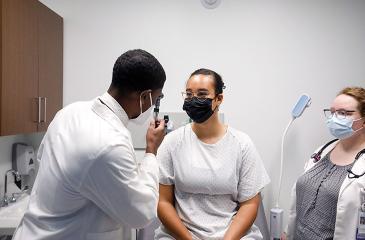Four years ago, Senait Judge-Yoakam had just graduated from college with a double major in dance and neuroscience when a friend mentioned she might be a good fit for M Simulation’s Standardized Patient (SP) program.
SPs are trained to portray individuals—from patients with specific medical conditions, concerns, and histories, to clients, family members, and health care professionals—in simulated clinical scenarios used in health care education and training.
“I have a background in dance and theater, but at that time I was preparing for a surgery for a dance career-ending injury, and I was trying to figure out what was next,” she said. “I attended an open group interview session for the SP program and found that it was a wonderful environment with people from all sorts of backgrounds, including a lot of artists and different types of health professionals. It was like my two worlds of science and art had come together; I felt right at home.”
Although she assumed being an SP may push her outside her comfort zone, Judge-Yoakam jumped at the chance to participate in the SP program.
Today Judge-Yoakam has participated in dozens of simulated clinical scenarios, ranging from simple clinical encounters to more serious or emotionally taxing cases. Each scenario or case requires hours of training beforehand, with cases lasting from a couple of hours to all day.
“When I first started as an SP, I was nervous to do any of the high emotion cases that included crying, delivering serious news, or were otherwise incredibly difficult,” she said. “But M Simulation SP trainers were great and walked me through how to set up a mental framework for participating in those cases, including developing a character’s backstory and how to pull from my own emotional experiences to tap into what my character is feeling and experiencing. The goal is to try to find a place of authenticity of emotions—often including grief and pain—and try to portray it so learners get a sense of the weight of what's going on. As hard as it is to portray challenging and heartbreaking cases, they're equally the most rewarding cases. Now, those are the cases I love to do.”
Judge-Yoakam says another favorite part of being in the SP program is the “wonderful community of SPs” she’s worked with over the years. “There’s a core of people who have been there throughout my entire time in the program, and some who have come and gone. Everyone has really interesting careers and back stories. We are all excited to see each other when we’re together.”
SPs help learners navigate mistakes as part of the learning process
In addition to portraying specific individuals in simulated experiences, SPs also provide feedback on the health sciences learners they interact with during each case.
“As an SP, it’s been amazing to watch students grow,” said Judge-Yoakam. “This year’s fourth year medical students were my first students I worked with as an SP. The growth from what I saw four years ago to today has been huge; these are totally different learners with a wide skillset.”
Judge-Yoakam says simulated experiences are important for students to feel safe in making mistakes and learning from them.
“Making mistakes is part of the growth process,” she said. “Learners get nervous, and that’s OK. Part of our job as SPs is to give them the space to mess up sometimes and try different things.”
Experience as an SP provides insight into her health career plans
Now a first year medical student at the U of M, Judge-Yoakam says her experience with the SP program made a difference when she was deciding what kind of institution she wanted for her medical education.
“What was really important to me was that I would come out a doctor who could see my patients as whole beings with many different life experiences rather than just the thing they're coming to me for care or advice,” she said. “I realized the U of M could help me achieve becoming the type of doctor I want to be because I had seen the medical training firsthand in the SP program.”
Judge-Yoakam says being an SP has also helped her to find compassion in many different areas of what a patient is experiencing, and not just focus on the medical care.
“My instincts are now always to ask, what are the contexts? Having that background as an SP, I know there are so many other aspects of someone's life that play into their health,” she said. “I'm a much better listener, even in my interpersonal relationships. I'm a better friend, daughter, partner. I have a better ability to listen and to provide feedback that is helpful, supportive and encouraging.”
Photo credit: Brady Willette



